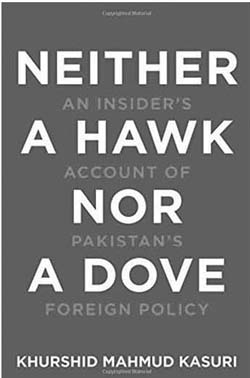Don’t talk of hawks and doves. We are running a foreign policy, not a bird sanctuary.’ Former External Affairs Minister K. Natwar Singh’s riposte in 1988 when asked whether he was a hawk or a dove. Khurshid Kasuri served as Pakistan’s Foreign Minister (2002– 07) when General Parvez Musharraf was President. He succeeded Abdul Sattar, a former career diplomat, whom Musharraf had appointed immediately following the 1999 coup. (Sattar had briefly served in the same capacity in a caretaker government in 1993.)
This voluminous book is divided into nine chapters devoted mainly to India and, within that, J&K. The author explains that ‘this book is largely about Pakistan’s difficult relations with India.’ It is known well enough that Pakistan remains India-centric. Relations with Afghanistan, the US, the World (including China) and a chapter on the Foreign Office account for the rest with one chapter detailing the author’s personal background and containing sketchy assessments of some leading personalities in Pakistan.
Even when it comes to relations with major countries, the basis is India. Kasuri says the ‘strategic underpinning’ for China-Pakistan relations was their relations with India. ‘Pakistan needed China’s help to strengthen its defence capabilities; China found it expedient to strengthen Pakistan. This was the unwritten basis of their relationship.’ Much the same logic applied to its relationship with the US—minus, of course, the morality theatre.
Kasuri takes pride in having held a key portfolio during what he terms was a ‘momentous’ period for Pakistan. His intention is to provide an ‘authoritative and personal’ account of Pakistan’s foreign policy during a period of ‘major strategic shifts’ in response to ‘new and rapidly evolving global imperatives.’ And yet, there is disappointingly little new information. All too frequently, he resorts to citations—Pakistani, Indian, western, others—to substantiate even what is already well known. The other disappointment is the bland re-statement of known official rationalizations even when they have been proven to be untrue. Was Mullah Omar never in Pakistan as he claims? What is one to make, for instance, of the reiteration of denials regarding Afghan Taliban presence in Pakistan including the existence of the Quetta Shura when the Taliban commanders are admitting that Mullah Akhtar Mansour was chosen as the successor to Mullah Omar by the Pakistan-based leadership council? There are further pointers to the Pakistan-Taliban nexus. On 11 December 2015, the Pakistan Defence Minister Khwaja Mohammad Asif made a statement, to the BBC Urdu service that Pakistan would use its influence with the Taliban for the security of the Turkmenistan-Afghanistan-PakistanIndia (TAPI) gas pipeline. The Afghan Presidential Palace was quick to point to this as yet more evidence of Pakistan’s close ties with the Taliban. How acceptable is Kasuri’s claim that Osama bin Laden was living in Abbottabad unbeknown to any section of the Pakistani establishment including the Army and the ISI? Or, that there was no official sponsorship of, or involvement with, those who attacked Mumbai on 26/11? Such affirmations can be treated as de rigueur when in office. Echoing them in perpetuity thereafter in disregard of the evidence that has since emerged, strains credibility.
The impression one gets is that Kasuri is shying away from discomfiting realities. In comparison, his boss, General Musharraf, has been outspoken in expressing his views on any and all subjects—in office and since. On 28 October 2015, in an interview to Pakistani paper Dunya News he said, ‘In 1990s the freedom struggle began in Kashmir… At that time Lashkar-e-Taiba (LeT) and 11 or 12 other organizations were formed. We supported them and trained them as they were fighting in Kashmir at the cost of their lives.’
Continue reading this review

